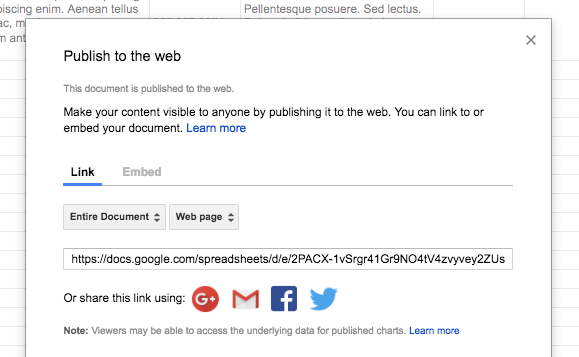🔴 UPDATE: Unfortunately, cmsish has stopped working, since Google deprecated the API method that is used by cmsish. I'll try to find some time to create a V2 with the new google sheets API. 🔴
cmsish is the most simple CMS in the world. Demo: https://verticalgrain.github.io/CMSish/
Step 1: Create a google spreadsheet and enter some data. Select "File / Publish to the web" and copy the url in the pop-up.
<script src="cmsish.min.js" type="text/javascript"></script>
Step 3: In your HTML, wrap your content in handlebars script tags. Include a data attribute with the URL to your spreadsheet.
<body>
<script id="entry-template" type="text/x-handlebars-template" data-spreadsheet-url="ADD_YOUR_GOOGLE_SPREADSHEET_URL_HERE">
<!-- All your HTML goes between these script tags -->
<!-- Stop your HTML now -->
</script>
</body>
Step 4: Add content from the spreadsheet to your template with handlebars expressions. Handlebars expressions look like this: {{ title }}
Make your expressions by combining the spreadsheet sheet name and column name, separated by a period: {{sheet-name.column-name}}. Replace spaces with dashes, but leave the case the same as in your spreadsheet.
For example:
{{About-Us.Title}}
<body>
<script id="entry-template" type="text/x-handlebars-template">
<!-- All your HTML goes between these script tags -->
<h1>{{About-Us.Title}}</h1>
<p>{{About-Us.Introtext}}</p>
<p>{{About-Us.Phone}}</p>
<p>{{About-Us.Testimonial}}</p>
<!-- Stop your HTML now -->
</script>
</body>
<script type="text/javascript">
var myCms = new cmsish.init('GOOGLE_SPREADSHEET_URL');
</script>
To make a collection, create a new sheet, and add multiple rows for each column.
Loop through a collection with the #each helper, using the name of the sheet as the collection name:
{{#each Posts}}
<li>
<p>Post title: {{Title}}</p>
<p>Post author: {{Author}}</p>
<p>Post subtitle: {{Subtitle}}</p>
<p>Post main content: {{Main-Content}}</p>
<p>Post testimonial: {{Testimonial}}</p>
<img src="{{{Image}}}" />
<br/>
</li>
{{/each}}
Access a single row of a collection by referring to it's index. Posts are zero indexed, so the first one is 0, the second 1, etc
Post title for post #2: {{Posts.1.Title}}

